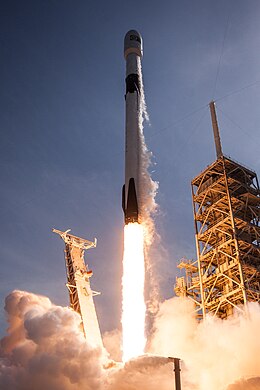Bangabandhu Satellite-1
 Launch of Bangabandhu-1 | |
| Mission type | Communications and Broadcasting Satellite |
|---|---|
| Operator | Bangladesh Communication Satellite Company Limited |
| COSPAR ID | 2018-044A |
| SATCAT no. | 43463 |
| Website | Bangladesh Satellite Company Limited, BSCL, Banban Satellite Project |
| Mission duration | 15 years |
| Spacecraft properties | |
| Bus | Spacebus-4000B2 |
| Manufacturer | Thales Alenia Space |
| Launch mass | ~3,709 kg (8,177 lb) |
| Power | 6kW |
| Start of mission | |
| Launch date | 12 May 2018, 20:14 UTC[1] |
| Rocket | Falcon 9 Block 5[2] (B1046.1) |
| Launch site | KSC LC-39A |
| Contractor | SpaceX |
| Orbital parameters | |
| Regime | Geostationary |
| Longitude | 119.1°E |
| Perigee | 35789.3 km |
| Apogee | 35798.5 km |
| Period | 1,436.1 minutes |
| Velocity | 3.07 km/s |
| Epoch | 6 June 2018 |
| Transponders | |
| Band | 14 C band, 26 Template:Ku band |
| Bandwidth | 36MHz |
The Bangabandhu Satellite-1 is Bangladesh’s first satellite for communication and broadcasting. It is named after the nation’s founder, Bangabandhu Sheikh Mujibur Rahman. The satellite was made by Thales Alenia Space and launched on May 12, 2018, from Kennedy Space Center in the USA.[1] This launch made Bangladesh the 57th country having a satellite of its own in space.[3] It is the first satellite to be launched by SpaceX's Falcon 9 Block 5 rocket.[4]
Construction
[change | change source]Bangabandhu Satellite-1 was made by Thales Alenia Space. It cost 248 million US dollars in 2015, with most of the money coming from a loan by HSBC.[5] The satellite has 40 Ku-band and C-band transponders and can work for more than 15 years.[6][7][8][9]
Launch
[change | change source]Bangabandhu Satellite-1 was launched on May 12, 2018, at 20:14 UTC using a SpaceX Falcon 9 rocket from the Kennedy Space Center in the USA.[2] It was the very first satellite launched with the new SpaceX Block 5 rocket model.[10][11] The launch was initially planned for May 10, 2018, but the rocket’s automatic system stopped the launch at T-58 seconds. The launch was then delayed by 24 hours and successfully took place on May 11, 2018.[12]
Operation
[change | change source]The satellite has ground control stations made by Thales Alenia Space and its partner Spectra. The main ground station is in Gazipur. The secondary ground station is in Betbunia, Rangamati.[13] On 12 May 2018, the first test signal was received.[14]
References
[change | change source]- ↑ 1.0 1.1 "SpaceX launch of first "block 5" Falcon 9 rocket scrubbed to Friday". CBS News. 10 May 2018. Retrieved 12 May 2018.
- ↑ 2.0 2.1 Krebs, Gunter. "Bangabandhu 1 (BD 1)". Gunter's Space Page.
- ↑ "What milestones have Bangladesh crossed in 50 years". Centre for Research and Information. 2021-03-26. Retrieved 2023-08-18.
- ↑ "SpaceX launches Bangabandhu-1 with most powerful Falcon 9 rocket". The Daily Star. 13 May 2018. Retrieved 19 May 2018.
- ↑ Mahmud, Faisal (12 May 2018). "Bangladesh to join space age amid skepticism about costs". Nikkei Asian Review.
The government borrowed 157.5 million euros ($188.7 million) from HSBC Holdings to finance the satellite.
- ↑ "Bangabandhu satellite deal inked with French firm". 11 November 2015.
- ↑ "Bangabandhu-satellite-equipment-purchase-deal-signed". Archived from the original on 6 August 2016.
- ↑ "BTRC-Thales Alenia deal over Bangabandhu Satellite signed". Archived from the original on 15 November 2015.
- ↑ "Bangladesh Taps Thales Alenia To Build 1st Telecom Satellite". 11 November 2015.
- ↑ "Příprava na Block 5 probíhá na několika místech". www.kosmonautix.cz (in Czech). 15 March 2018.
- ↑ "SpaceX to launch Bangabandhu-1 satellite atop Block 5, the most powerful Falcon 9 rocket to date". PBS NewsHour. 11 May 2018.
- ↑ "Bangabandhu-1 successfully launched by first Block 5 Falcon 9 – SpaceX's goal of affordable access to space". NASASpaceFlight.com. 11 May 2018.
- ↑ "Bangladesh receives test signal from Bangabandh u-1 satellite". bdnews24.com.
- ↑ "বঙ্গবন্ধু স্যাটেলাইটের সিগন্যাল পেয়েছে গাজীপুরের গ্রাউন্ড স্টেশন". Bangla Tribune (in Bengali).